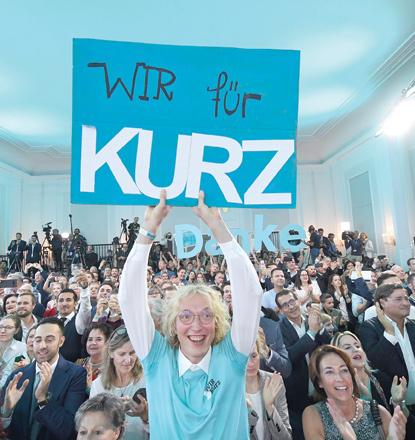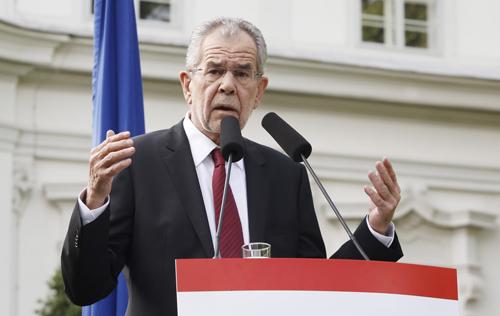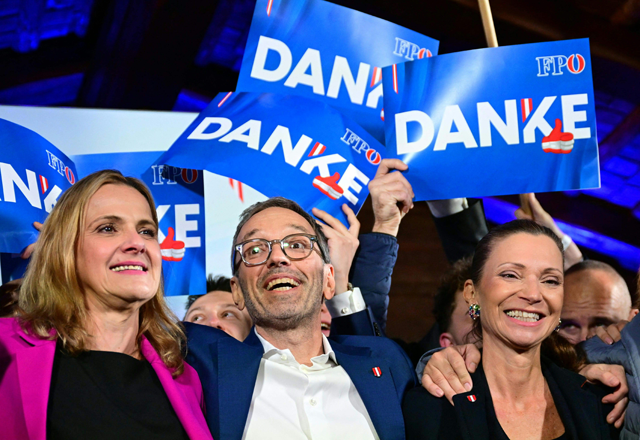You are here
Austria votes with conservatives in lead despite far-right scandal
By AFP - Sep 29,2019 - Last updated at Sep 29,2019

A supporter of Austria's People's Party holding a placard reading ‘We for Kurz’ reacts to exit polls during the party's electoral evening in Vienna, Austria, on Sunday (AFP photo)
VIENNA — Austrians voted on Sunday with the conservatives expected to win most seats but not a majority, forcing them into difficult coalition negotiations after a corruption scandal brought down their coalition government with the far-right.
The People's Party (OeVP) led by 33-year-old Sebastian Kurz is predicted to win around 33 per cent, up slightly from the last election two years ago but not enough to form a government on its own.
"We had too much chaos in the last months. We hope for something less chaotic," Vienna voter Clara Heisinger told AFP.
The parliamentary election was brought about by the "Ibiza-gate" corruption scandal that engulfed Kurz's far-right coalition partner in May, after just 18 months in government together.
"Our most important election goal is that there will be no majority [in parliament] against us," Kurz said after casting his vote in Vienna.
The former law student, who has enjoyed a rapid ascent through the ranks to become the youngest-ever chancellor in 2017, has "nothing to win, but a lot to lose", Die Presse daily warned in an editorial on Saturday.
"Even with a nice plus on Sunday, it is more difficult for him than in 2017," it said, adding there was no partner that quite suited any more.
With 6.4 million people eligible to vote, polling stations across the country opened at 7am (05:00 GMT) and will close at 8pm (15:00 GMT) when the first projections are expected.
Far-right troubles
The vote is also seen as a test for the far-right Freedom Party (FPOe) after "Ibiza-gate" brought down its long-time leader. A fresh investigation against him — this time of alleged fraudulent expense claims — was announced this week.
Norbert Hofer, a former aircraft engineer who took over the party after "Ibiza-gate", admitted the FPOe was facing "a real challenge".
"It's hard to say what the results will be. It's important for us to get a stable basis after this election to strengthen the FPOe," Hofer told reporters after voting in his native Pinkafeld, 120 kilometres from Vienna near the Hungarian border.
A renewed coalition with the far-right — touted by Hungarian Prime Minister Viktor Orban and other nationalists as a model for all of Europe — looked likely until the new allegations shook the party this week, threatening to lower the 20 per cent of votes it was expecting to get.
"We vote to decide in which direction we will go — that of Orban and the populists, or if we stay oriented towards Europe... we decide if the corruption will go on," said Vienna voter Gabriel Steiner, 29.
Climate matters
Unlike in 2017, the top voter concern is not immigration — a welcome topic for Kurz and his former far-right allies — but climate change.
"It's an important vote for the climate. Past governments have done much too little," Vienna voter Peter Litzlbauer, 26, said.
Against this backdrop, Austria's Greens — who failed to get into parliament in 2017 in a shock result — look set to make the biggest inroads.
They are tipped to garner 13 per cent, up 10 percentage points from two years ago.
It remains to be seen if Kurz will try to woo them and another small party, the liberal NEOs, to form a partnership.
Another option for Kurz could be a coalition with the Social Democrats (SPOe), who according to surveys stand at a new historic low of 22 per cent.
Since World War II, either the OeVP or SPOe have always governed, and for 44 years in total the two ruled together, but it was Kurz who ended their last partnership, leading to the 2017 polls.
He has also floated the idea of ruling in a minority government. But this would potentially further political uncertainty and even trigger another election.
Either way, negotiations between parties are expected to take months again. Ultimately, President Alexander Van der Bellen, a former Greens leader, will need to approve any government.
The OeVP-FPOe government imploded in May when two German media outlets published footage filmed secretly on the Spanish resort island of Ibiza, showing then FPOe leader Heinz-Christian Strache appearing to offer public contracts in exchange for campaign help from a fake Russian backer.
In the aftermath, Strache resigned from all posts, including that of Kurz's vice chancellor.
Related Articles
VIENNA — Austria’s far-right on Monday nominated former interior minister Herbert Kickl, an idealogue behind campaigns using Islamophobic rh
VIENNA — Austria’s Norbert Hofer narrowly failed Monday to become the EU’s first far-right president after his ecologist rival scraped to vi
Vienna — Austria entered uncharted territory Monday after the far right scored a historic national election win, with parties facing an uphi

















